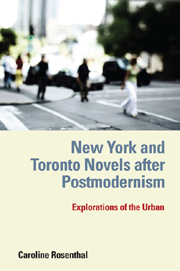Book contents
- Frontmatter
- Contents
- Preface and Acknowledgments
- Introduction
- 1 Imagining National Space: Symbolic Landscapes and National Canons
- 2 Articulating Urban Space: Spatial Politics and Difference
- 3 “The Inadequacy of Symbolic Surfaces”: Urban Space, Art, and Corporeality in Siri Hustvedt's What I Loved
- 4 Rewriting the Melting Pot: Paule Marshall's Brownstone City in The Fisher King
- 5 Specular Images: Sub/Urban Spaces and “Echoes of Art” in Carol Shields's Unless
- 6 “The End of Traceable Beginnings”: Poetics of Urban Longing and Belonging in Dionne Brand's What We All Long For
- 7 Synthesis
- Bibliography
- Index
6 - “The End of Traceable Beginnings”: Poetics of Urban Longing and Belonging in Dionne Brand's What We All Long For
Published online by Cambridge University Press: 12 September 2012
- Frontmatter
- Contents
- Preface and Acknowledgments
- Introduction
- 1 Imagining National Space: Symbolic Landscapes and National Canons
- 2 Articulating Urban Space: Spatial Politics and Difference
- 3 “The Inadequacy of Symbolic Surfaces”: Urban Space, Art, and Corporeality in Siri Hustvedt's What I Loved
- 4 Rewriting the Melting Pot: Paule Marshall's Brownstone City in The Fisher King
- 5 Specular Images: Sub/Urban Spaces and “Echoes of Art” in Carol Shields's Unless
- 6 “The End of Traceable Beginnings”: Poetics of Urban Longing and Belonging in Dionne Brand's What We All Long For
- 7 Synthesis
- Bibliography
- Index
Summary
The place where all names were forgotten and all beginnings recast. In some desolate sense it was the creation place of Blacks in the New World Diaspora at the same time that it signified the end of traceable beginnings.
— Dionne Brand, A Map to the Door of No Return: Notes to BelongingDionne Brand's 2005 novelWhat We All Long For delves into the daily multicultural realities of Toronto. The novel scrutinizes the encounters and exchanges between people who have different histories of belonging as well as longings for the future. Dionne Brand has been one of Canada's most articulate and outspoken voices on issues of racism, sexism, and the effects of capitalism within the nation state. In many different capacities — as an award-winning poet, novelist, essayist, and filmmaker as well as political activist and teacher — she has counteracted the invisibility of black people in Canadian political, social, and literary discourses. Brand's texts rewrite the history and literary canon of a nation that, despite the massive immigration of people from all parts of the world, still fundamentally perceives of itself as a northern and European nation. Altering this “unchanging narrative” involves an analysis of institutionalized racism, which prevails despite a state policy of multiculturalism, as well as of the material conditions that keep blacks from fully participating in economic and political power. Yet, since “the making of Canadian literature has coincided, in many respects, with the making of the Canadian state” it also entails the contribution of stories to the literary canon that document the diversity of black life, history, and experience in Canada.
- Type
- Chapter
- Information
- New York and Toronto Novels after PostmodernismExplorations of the Urban, pp. 215 - 263Publisher: Boydell & BrewerPrint publication year: 2011



